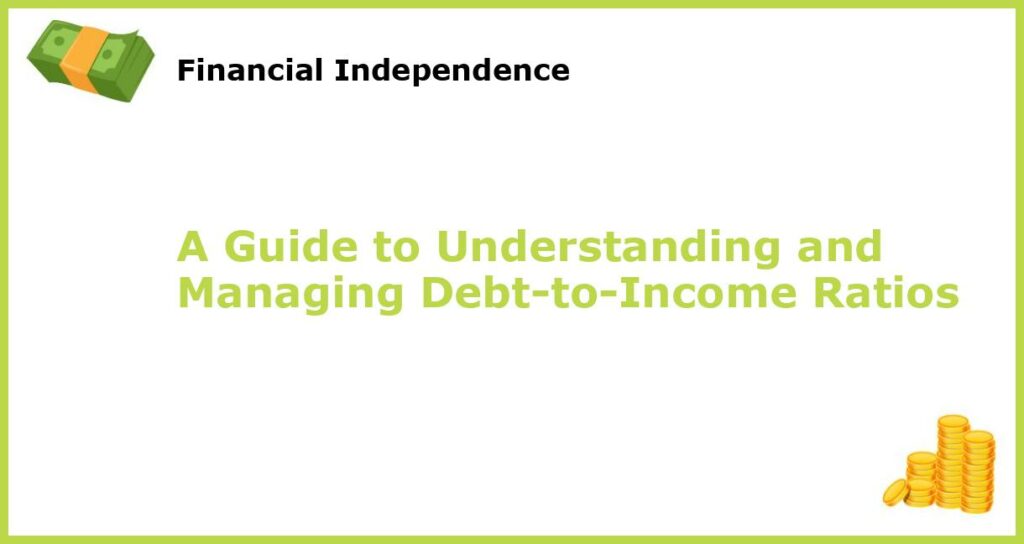If finances are like a game, then the debt-to-income ratio (DTI) is the scoreboard. It tells you how well you are doing with your money. Understanding your DTI is essential to managing your finances and achieving financial stability. Here is a comprehensive guide to understanding and managing debt-to-income ratios.
What is a Debt-to-Income Ratio?

A debt-to-income ratio is a financial measurement that compares your monthly debt obligations to your monthly income. It calculates the percentage of your income that you spend on debt repayments each month. It’s a simple formula that helps lenders determine whether you are capable of repaying your debts. It is calculated by adding up all your monthly debt payments and dividing the total by your gross monthly income.
For example, if you pay $800 in rent, $200 in car payments, $100 in credit card bills, and you earn $3000 per month, your DTI ratio would be 36%. (($800+$200+$100)/$3000)*100= 36%.
Why is a Debt-to-Income Ratio Important?

A high DTI can indicate that you may have difficulty making payments on any additional debts you take on. This is critical when you apply for credit, as lenders use your ratio to determine the level of risk involved when lending you money. A high DTI may result in fewer loan offers or higher interest rates, making it essential to monitor your ratio.
Understanding your DTI can also help you make more informed financial decisions. It can help you determine how much you can afford to spend on a new car or a house.
How is a Debt-to-Income Ratio Calculated?

To calculate your DTI, you need to add up all your monthly debt payments and divide the total sum by your gross monthly income. The result is expressed as a percentage. A high DTI means that you are spending more than you earn and may be carrying a higher risk of default.
Calculating your DTI can be tricky if you have variable income, such as freelancers or self-employed individuals. In this case, you can use an average income over the past few months as a basis for your calculation.
Understanding the Different Types of Debt-to-Income Ratio

There are two types of DTI: Front-end and Back-end. Front-end ratios only consider your housing-related expenses, while back-end ratios include all obligations like credit card payments, car loans, and student loans. You should aim for a back-end ratio of 36% or lower.
Front-end ratios are used primarily by mortgage lenders to determine how much you can afford to borrow for a home. A front-end ratio that exceeds 28% is generally considered high and may disqualify you for a mortgage.
What’s a Good Debt-to-Income Ratio?

Each lender has its preferred debt-to-income ratios. Still, in general, borrowers with a DTI of 36% or less are considered to have good ratios. This means they have enough disposable income to cover their monthly expenses before lenders consider any new debt obligations.
A DTI ratio of 43% or more is considered risky, and lenders may not approve your loan application or may charge higher interest rates.
How to Improve Your Debt-to-Income Ratio?

If you have a high debt-to-income ratio, several strategies can help you improve your finances. You can pay off your debts, increase your income or reduce your expenses. Paying off your debts can help you lower your DTI and give you more disposable income. Selling off some of your assets or taking side hustles can help you increase your income. Alternatively, reducing your expenses by avoiding unnecessary spending can help you reduce your DTI. Consider debt consolidation if you have multiple loans with high-interest rates, and you can’t manage them.
The Impacts of a High Debt-to-Income Ratio
If you have a high DTI ratio, you may struggle to access new credit or loans. Moreover, high levels of debt relative to your earning can also put you under significant stress and lead to mental health issues, such as anxiety and depression. It may also affect your ability to save for retirement or other financial goals.
Additionally, high levels of debt can lead to defaults, missed payments, and even bankruptcy. These effects can damage your credit score, making it difficult to get approved for credit or loans in the future.
Understanding the Risks of High DTI
Having high levels of debt-to-income ratio can increase your chances of facing financial difficulties, such as missed payments, defaults, and even bankruptcy. This, in turn, can damage your credit score, making it difficult to get approved for credit or loans in the future.
It can also limit your opportunities to access financing, approve credit cards, or even buy a home. High DTI can also lead you to incur high-interest rates which result in you paying more for the money you borrow.
The Benefits of a Low Debt-to-Income Ratio
On the other hand, maintaining a low DTI can help you achieve financial stability and flexibility. It can increase your chances of getting approved for loans, lower your interest rates and monthly payments and even free up cash flow to put towards savings and investments.
With a low DTI ratio, you will have enough disposable income to cover your expenses and still have money left over for unexpected emergencies, investments, or even vacations.
How to Monitor Your Debt-to-Income Ratio
To monitor your DTI ratio, you should track your monthly expenses, income, and debt payments. Keep track of your credit card statements, student loans, and other debts. You can also use various online calculators to determine your ratio. Regularly reviewing your DTI and taking action to manage it can help ensure you remain financially stable.
Remember that your DTI can change over time, and it’s essential to monitor it as you take on new debts, lose or gain income, or make significant financial decisions.







